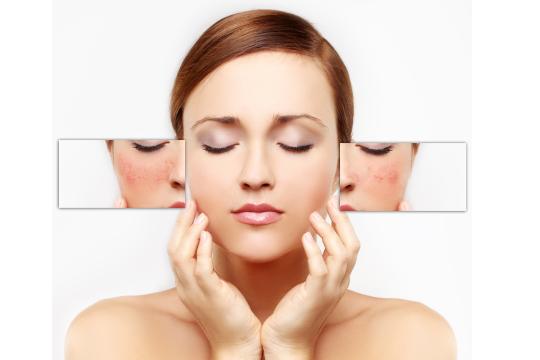There’s a distinct emotional tug-of-war involved when you’re plunking down a chunk-of-change for that anti-aging in-office treatment or at-home skincare regime. On the one-hand, the results are fantastic—a reductions in fine lines and wrinkles, improved hydration, and the taut pore-less visage of a babies cheek—one the other hand, beauty ain’t cheap. Imagine then, the added insult when the karmic rules of the universe stick it to you—and just like that—your favorite beauty product stops working.
Maybe you’ve been there? Happily sailing along with your skincare routine when suddenly you start to notice that your once-luminous results are lacking the luster they once produced. So what the heck is going on? Did our product really just stop working? Is that even possible? Maybe. Let’s unpack.
“It’s Not You, It’s Me.”
That perennial break-up line reveals itself to be true once again—because just like a fleeting online romance, it’s not necessarily your product causing the change in results, it might actually be you.
As the seasons change, your skincare needs do too. We spoke to Abbey Helton BSN, RN, CPSN, Clinical Director for Dr. Joseph Banis Plastic Surgery who explained, “Just like anything else we do - exercise, diet, hair, etc., adapting to the current circumstances is good. For example in the winter – humidity levels are down, our skin is dry, and we may be drinking hot caffeinated beverages more, therefore adding to the dehydration of our skin. In the summer, humidity levels are up and so our skin may be oilier.” And all that seems like logic. So before you go blaming your beloved night cream for breaking your heart, make sure your skin isn’t simply adapting to a change in season, necessitating that you consider a change in product.
“Ah heck, Maybe it is them too.”
Before you start snatching up all the blame (#greedy), your product might be partially to blame too. You may not have guessed that your skincare products would be as persnickety as your skin, but when it comes to the container it’s housed in, and the environment in which you store it, it might be true. Many products are chock full of perishable and active ingredients that require proper storage to maintain their effectiveness, so where you choose to store your favorite product actually matters quite a bit.
“Most companies are going to tell you that cool and dark environments are best,” offers up Helton. “Extreme temperatures—especially heat—can change the effectiveness and stability of certain ingredients.”
For example, let’s look to one ingredient in particular that’s probably lurking amongst your favorite skincare products: retinol. Powerful anti-aging ingredient? Yes. As unstable as your last Tinder date? Also yes. Exposure to air, light and heat can render retinoids virtually useless. And if you’re using a retinoid product that’s expired? Forget about it.
The point is that the proper care of your skincare products is as important as consistent use. And with that we’re actually boomeranging the blame back to you. You’re the person storing the darned things, after all. We suggest you peer into the active ingredients list on your products and ask your doctor about the specific needs of any medical grade product that might be a part of your skincare regime.
Time to upgrade?
And sometimes it’s not just where you’re storing your products, or the literal changin’ o’ the seasons, sometimes it’s the figurative changes too… aka. the aging process. The aging process can necessitate a more potent response to skin woes, and while cosmetic grade products from the drug store might have seen you through your 20’s, it’s possible that it’s time to upgrade to more potent medical-grade skincare products that are recommended by your doctor. FYI: if you’re suffering with a skincare condition like acne, rosacea or any type of skin sensitivity, then it’s definitely time to upgrade.
The undeniable truth is that medical-grade skincare products are more potent than cosmetic (drugstore) products and are better able to target the specific needs and correct the problems that your over-the-counter product just can’t. The FDA puts strict limits on ingredient usage in cosmetic products to protect self-diagnosing consumers with even the most sensitive skin from misdiagnosing and hurting themselves. And let’s not insult each other by pretending that we’ve never self-diagnosed after a Google search—I think we’re better than that.
It’s not simply product potency either. Many medical grade skincare products also have improved delivery systems to better drive the ingredients deeper into the inner layers of the skin. And you know who stays abreast of all the latest and greatest advances in skincare? Your doctor. So the fact that you’ll be sourcing out these products under the recommendations and guidance of a board-certified plastic surgeon, your dermatologist or another highly-skilled skincare professional means that you can move forward with confidence that your skincare regime is the best suited and most targeted way to address the needs of your every-changing skin.
We all want what’s best for our bodies largest organ (the skin), right? And the sad truth is that the needs of your skin aren’t immune to the fact that all things change. (*sigh) So if your beloved skincare product seems to be betraying you, stop guessing at the blame game and schedule a sit down between you, the list of the products that currently comprise your skincare regime, and your doctor. Together you can source out any problems and create a results-oriented skincare regime that’ll address the seasonal, age-related and product related issues all in one or two or three fell swoops.







